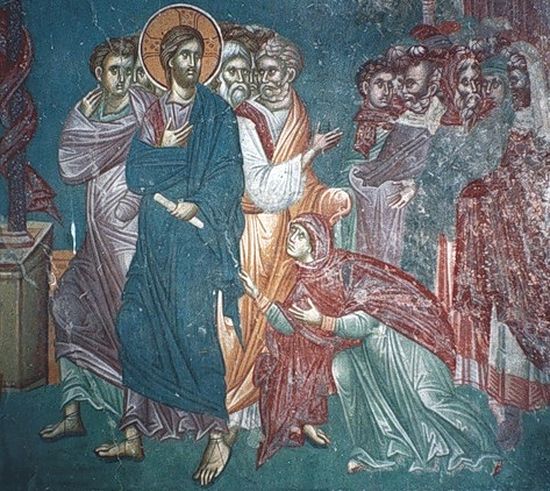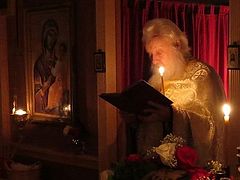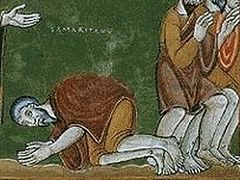Luke 8:41-56
Even in a small parish like ours, it is not hard to see that people are different from another in many ways. We have different interests, personal backgrounds, and opinions on all kinds of things. We do not all look or dress alike. But what we have in common as Orthodox Christians is far more profound than any of that. Our salvation is not in any conventional human characteristic or endeavor, but in the healing mercy of Jesus Christ.
In today’s gospel passage, two very different people approached Him in humble faith and received new life as a result. Jairus was a ruler of the synagogue, an upstanding man in the Jewish community. We do not know the name of the other person, but she had little in common with Jairus. She was a woman who had been bleeding for twelve years, and had spent all her money on treatments that did not help her. She was not only poor, but also considered unclean because of the flow of blood. As a result, she would have been alone, for anyone who had physical contact with her would also become unclean. She could not even enter the Temple or have a normal social life. For twelve years, she had lived as someone cut off from God and from everyone else.
Jairus sought out the Lord and asked Him to heal his daughter, who was dying. But the woman could not even do that. She knew how others viewed her and perhaps she even viewed herself as a miserable, isolated, unclean woman not worthy of the attention of the Messiah. She did not ask Him to lay hands on her for healing, for that would make Him unclean also. She may have thought that He would have refused to heal her for that very reason. She was understandably embarrassed to have a public discussion with Christ about her medical condition. But she had enough faith and hope in Him to reach out and touch the hem of His clothing in the middle of a large crowd. Perhaps she could get what she wanted without drawing attention to herself.
And when she did reach out to Him in that way, she was healed. She had not made Christ unclean or been refused or humiliated by Him; instead, He had made her well. Of course, she was terrified when the Savior asked, “Who touched me?” She kneeled before Him in humility, shaking with fear, and confessed to Him– and to everyone else–that she was the one. Who knows just what was going through her mind in that moment when the Lord said, “Daughter, be of good cheer; your faith has made you well. Go in peace.”
Did you notice that, before her healing, she had not said anything to Christ, not even identifying herself to Him? She never asked Him for anything, probably because she was too embarrassed and afraid to do those things. But she still did what little she could, at least reaching out to Him in faith. The Son of God knew who had touched Him, of course, but asked who it was in order to give her an opportunity to confess her faith, to make clear to herself and everyone else that His healing mercy extended even to her. In doing so, He showed that His abundant mercy extends even to those so broken and discouraged that they can just barely bring themselves to reach out to Him.
If we are honest, we will recognize ourselves in her humble example. Who is not embarrassed and discouraged due to some long-term struggle, some weakness or burden that we have virtually lost hope of overcoming? We may have experienced an embarrassment or humiliation so profound that we can barely acknowledge it to ourselves, much less to God or to other people. For whatever reason, we may have come to believe that we are unclean and unworthy of His mercy or of healthy relationships with others. It may seem impossible to find the words to express our sufferings either in conversations with those closest to us or in prayer. Like that poor woman, we may feel alone, unworthy, and ashamed.
When that is our situation, we must follow her example of touching the hem of His garment, of reaching out to Christ for help as best we can. Even as He did not embarrass or reject her, He will not turn us away. He will respond graciously, as He always does to humble, sincere people who come to Him with faith, love, and repentance. Instead of us somehow making Him unclean, He will work through our faith to bring healing, mercy, and strength.
Jairus approached the Savior differently, openly asking Him to heal his dying daughter. But his faith was then put to a very difficult test. The girl died, but the Lord said that she was only sleeping. Everyone ridiculed Christ for that statement, but Jairus somehow believed the astonishing word of the Lord: “Do not be afraid; only believe, and she will be made well.”
How hard it must have been for Jairus and his wife to hear this news and to believe in the Lord’s promise. Their daughter had just died and the mourning had already begun. It was time to get ready for the funeral, and here was Christ denying the obvious. Their faith was put to the test, but they somehow still believed. And the Lord did as He said: He brought the girl back to life.
This healing was not as simple as Jairus had hoped. He was probably the kind of person used to getting what he wanted. If anyone could expect the help of the Messiah, it was an upstanding leader of the synagogue. But just as Abraham’s faith was tested by the command to sacrifice Isaac, his faith was tested when his daughter actually died. It is one thing to heal the sick, but quite another to believe that someone can raise the dead. But probably with great fear and doubt, Jairus still managed to believe. He trusted Christ as best he could. And through that little bit of faith, the Lord showed His power over the grave and His unfathomable mercy for His suffering sons and daughters.
The differences between Jairus and the bleeding woman in social standing and reputation were ultimately irrelevant for how they stood before the Lord. The key point is that they did not stand; instead, they kneeled before Him in humble faith. Human characteristics and differences are ultimately irrelevant when it comes to our ability to follow the example of these two people. Though we will all do it differently in some ways, we can all open the wounds and sorrows of our lives to Him for healing as best we can in humble faith. We may still doubt, but there is no doubt that He will hear us and respond as is best for our salvation, for the healing of our souls. We must not judge ourselves or others as though it were up to us to determine who is worthy of Christ’s blessing. Let this sink in: None of us is worthy or deserves anything from Him. Our hope is not in ourselves or what anyone owes us, but in the gracious mercy which He gives to all who reach out to Him from the depths of their souls with even a small bit of humble faith.
If you ever despair of the possibility of being healed and transformed by our merciful Savior, remember the woman who merely touched the hem of His garment and the man who somehow trusted that Christ could bring his daughter back to life. If you ever think that sin and death will have the last word about you, turn to the One Who went to the Cross, the tomb, and Hades in order to bring us into the eternal joy of His resurrection. If we come to Him in humble faith, presenting all our wounds for His healing as best we can, He will not send us away. Instead, He will heal our souls by His gracious mercy and make us already participants in life eternal.




